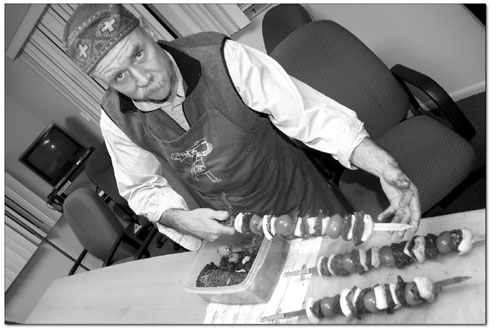|
|
||
|
Food during wartime
by Chef Boy Ari hen you’re a journalist in the war-torn Caucasus, you should learn to do a few things. You’ll need to know how to board an MI-8 helicopter that’s swarmed by refugees desperate for a way out of the war zone. When visiting friends who live on the front lines, it helps to know how to run like a rabbit, sprinting in an erratic zig-zag fashion to avoid sniper bullets, using buildings, wreckage and clouds of smoke for cover. And when recounting your war stories over vodka, you need to remember to leave a few sips in the bottle to prove that you believe in next time. You need to learn how to talk to spies, earn the trust of corrupt politicians and hitch rides from rabid militiamen. And you need to know how to deal with colossal levels of survivor’s guilt, after too many of your friends have died too soon. Thomas Goltz, who knows how to do these things, was cooking dinner last week for his friend Babk Rezvani, an Iranian-raised Georgian professor visiting from the University of Amsterdam. Goltz laid three swords on a cutting board next to a dish of marinating antelope and elk chunks. The swords, purchased in Turkey, are called shish, which in Persian means “skewers,” and as you might guess they are used to cook the kebab, or “grilled meat” – one of many dishes that Goltz prepared. And as with his reporting, his hunting, his teaching and his habit of diving head-first through the pushed-in rear windows of Russian choppers, Thomas is muscling all of his energy into this meal. Perhaps it’s a habit he learned in parts of the world where feasting is something you must do in order to keep your sanity while everything falls apart around you. Georgia Diary, Goltz’s most recent book, contains many mouth-watering descriptions of eating and drinking – usually not in that order – woven into his lively and shellshocked narrative: “…the idea of feasting was a basic pillar of the Georgian identity, no matter how expensive such pretensions of nobility were to main tain. As Rustaveli once wrote: ‘Everything you give away remains yours, and everything you keep is lost forever.’ Tables sagged under the weight of the diverse dishes … khatchapuri, or flat bread stuffed with goat cheese; khingali, or steaming hot dumplings that must be doused with black pepper and eaten with the fingers … .” While the book’s list continues, the banquet, which was held at the house of a Reuters correspondent in the Georgian capital of Tblisi, was temporarily broken up by an “uninvited Mkhedrioni guardsman, bearing a machine pistol and looking for his girlfriend (who quickly exited via a window) … .” After disarming the interloper – another useful skill in those parts – the party continued as “people laughed and danced in the face of, or perhaps because of, the fact that they were living in a real-life cabaret, a society that was singing while spinning downward into doom.” In addition to the elk and antelope kebabs, there were köfte, or patties of spicy antelope meat. Maia Sukhiavili, a Georgian professor of Persian at UM, brought a salad that wasn’t Georgian per se (“It’s just Russian, European and Georgian,” she explained) and a fantastic Georgian eggplant-and-walnut dish called badrigani nigv zit. Tied for the highlight of the meal were two dishes that, in very different ways, turned the toughest cuts of meat into spoon-friendly morsels you could chew with your gums. The advantage of making these cuts so mastication-friendly is that the toughest parts tend to be the most flavorful. The khorak, or meat stew, brought a deer shank to a state of tenderness by subjecting it to a long, slow cook in the company of carrots, onions, garlic, spices, apples, pears, pineapple and whole plums; it was served in a large vat. While the khorak could be said to have achieved its tender perfection through the time-honored art of “cooking the shit out of it,” the other cut, a boneless and meticulously trimmed elk shoulder, achieved its tenderness via the just-as-time-honored method of “kicking the shit out of it,” i.e. the chef had lovingly pounded the meat with a tenderizing hammer until its connective bonds were crushed and then rubbed garlic and “secrets” into it before rolling, netting and grilling it. When the outside had a nice crisp to it and the inside was still raw but warm, the roast was cut into rounds, sprinkled with pomegranate seeds (“the royal fruit, and an antioxidant to boot,” noted a geography professor, who had inexplicably brought guacamole to the Georgian feast), and served with pomegranate molasses and the ubiquitous tkhemali, or tart plum sauce. Although this elk shoulder sushi, more tender than any backstrap, bore a distinct Caucasian flair, it goes by the name “Tommy the Turk’s Famous Elk Shoulder Roast.” We feasted like Georgians, uninterrupted by machine gun-wielding tribesmen. Leaving nothing at the bottom of the bottles, we toasted to a bright future for Georgia. •
|
In this week's issue...
- December 18, 2025
- Let it snow
Although ski areas across the West have taken a hit, there’s still hope
- December 18, 2025
- Look, but don't take
Lessons in pottery theft – and remorse – from SW Colorado
- December 11, 2025
- Big plans
Whole Foods, 270 apartments could be coming to Durango Mall parcel


